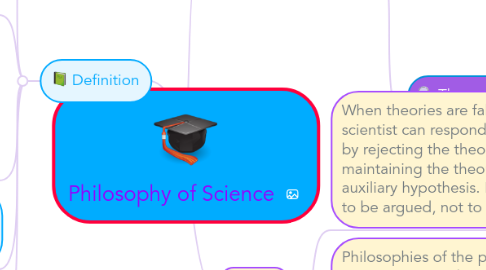Philosophy of Science
por muhammad shazmel


1. Definition
1.1. Branch of philosophy concerned with the foundations, methods and implication of science
1.2. The study from a philosophical perspective of the element scientific inquiry = central question etc what is science?, what is not science?, what is characterizes science?.
1.3. Philosopher of science spend time to find the line between science and non-science, trying to figure out the logic with which scientific claims are grounded, working to understand the relation between theory and empirical data, and working out the common thread that unites many disparate scientific field.
1.4. Philosopher of science aim to answer different questions than the working scientist is trying to answer.
1.5. It is to answer questions about science, not scientific questions.
2. Philosopher
2.1. Karl Popper
2.1.1. He made significant contribution to debates concerning general science methodology and theory choice, demarcation of science from non-science, the nature of probability , quantum mechanics , methodology of social science.
2.1.2. PROBABILITY - Popper argues that it can be used to interpret
2.1.3. He also came to understand that not all scientific achievement was created equal. He ended up making an important distinction between science and what he called pseudo-science. He taught us value about the nature of knowledge itself.
2.2. Thomas Samuel Kuhn (1922-1996)
2.2.1. Claimed the development of scientific discovery was not linear, but cyclical.
2.2.2. He also believed that science was punctuated by revolutions that sign allied major shifts in scientific understanding.
